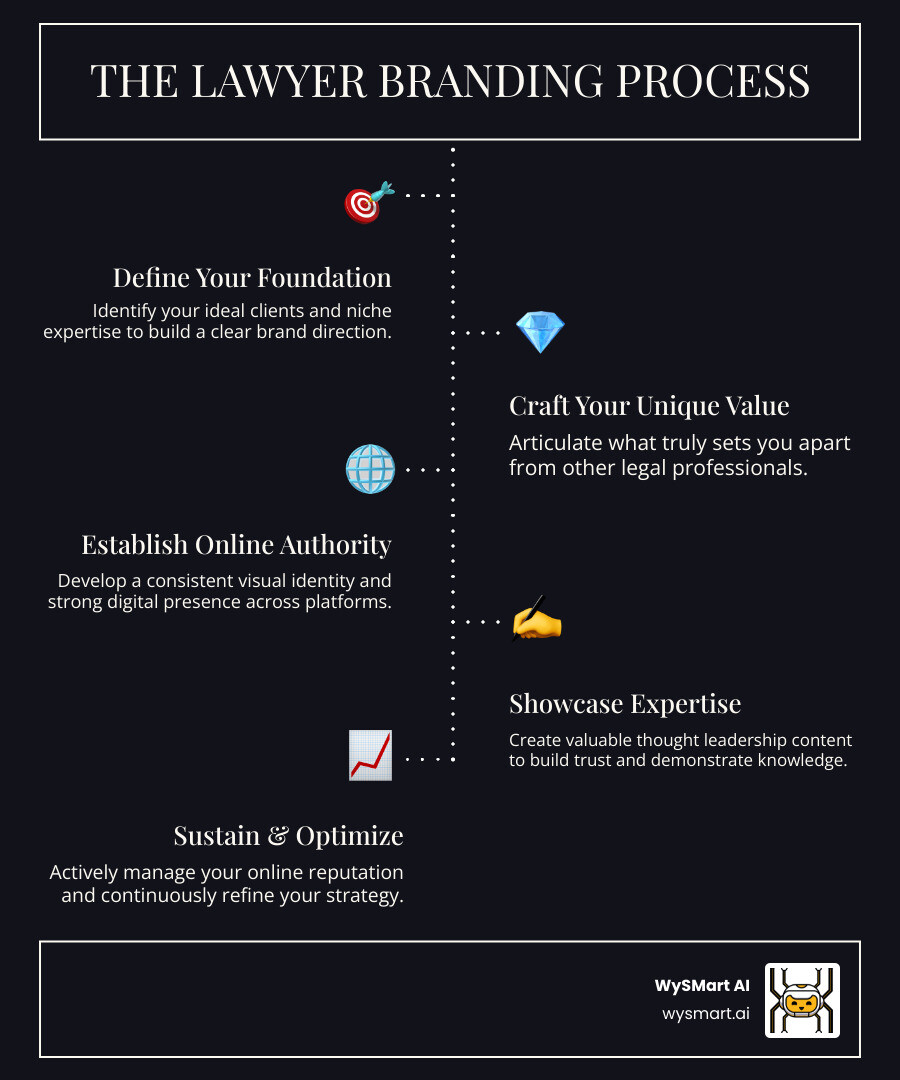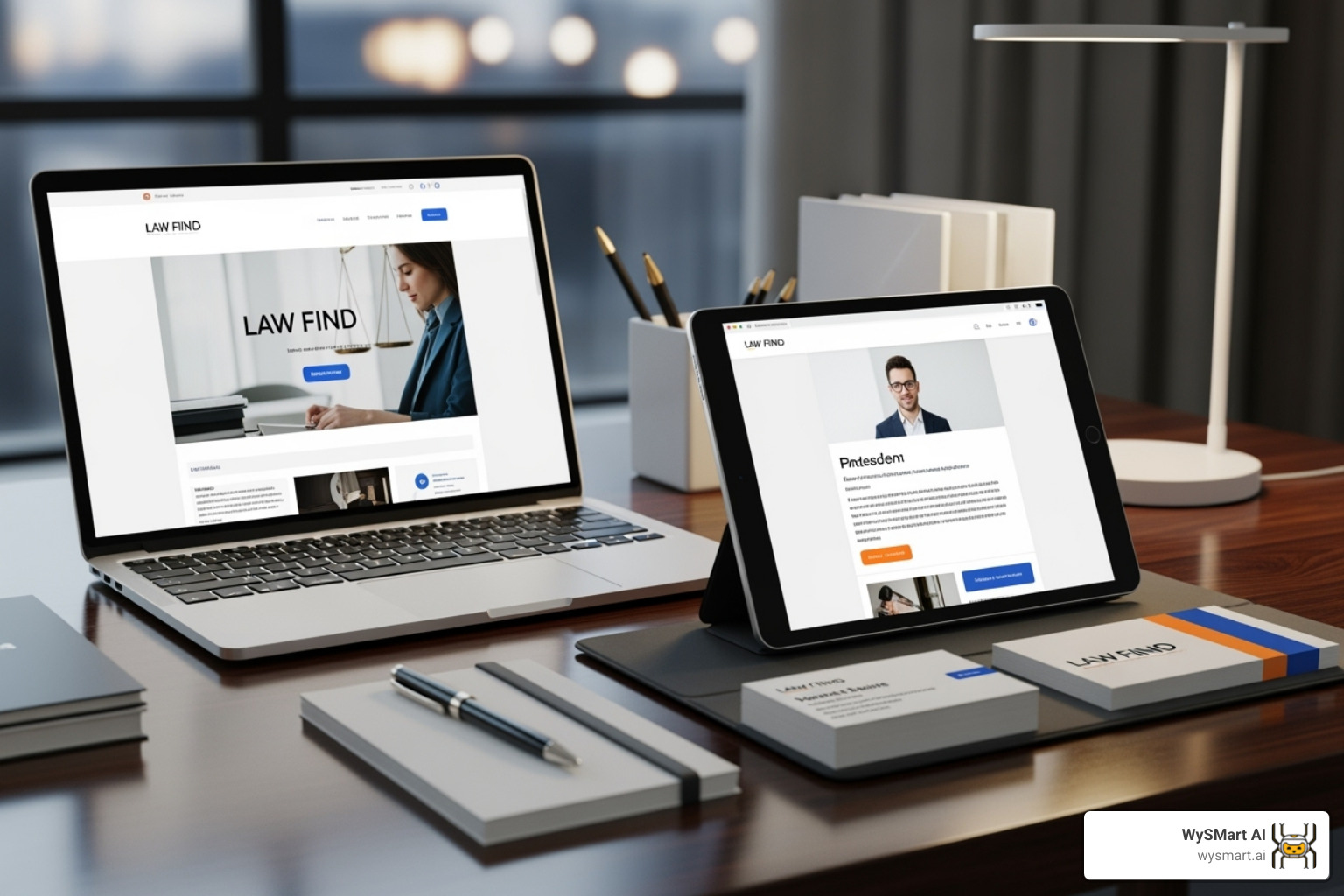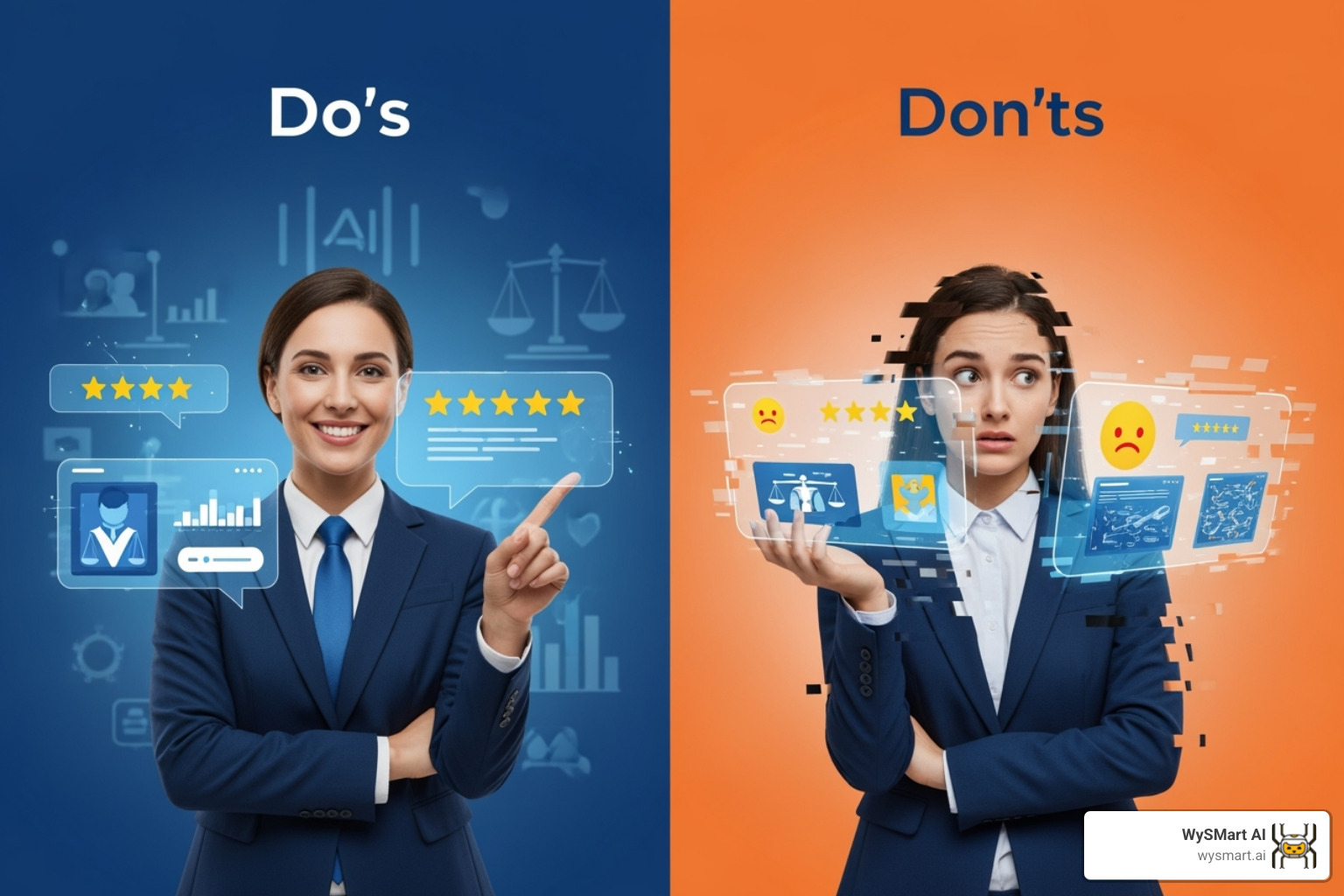
Beyond the Briefcase: Crafting Your Unique Lawyer Brand
Why Your Brand is Your Most Powerful Asset (Before the Gavel Even Drops)
Branding for lawyers has evolved from a luxury to a necessity in today's competitive legal landscape. With over 449,000 law firms competing for attention, your personal brand is what transforms you from just another lawyer into the trusted legal advisor clients actively seek. Clients now research attorneys online long before making contact, forming impressions based on your website, social media, and online reputation.
Statistics tell a compelling story: clients prioritize reputation (43%), positive reviews (30%), and relevant experience (40%) far more than low rates (16%). These figures aren't just abstract data points; they represent a fundamental shift in how legal services are purchased. The fact that reputation and experience dwarf low rates means that the race to the bottom on pricing is a losing strategy. Instead, the winning strategy is to build a brand so strong that clients perceive your higher fees as a worthwhile investment in quality and peace of mind. For modern firms, a strong digital presence is key, with 81% using websites as their primary marketing channel and over 40% relying on social media to attract business.
Your brand communicates your unique value, builds trust before the first consultation, and attracts the exact clients you want to serve. Whether you're a solo practitioner or part of a larger firm, a strong personal brand can accelerate your career and command premium fees.
I'm Joey Martin, founder of WySMart.ai. I've helped hundreds of professionals build powerful digital brands that drive real business growth. My experience in branding for lawyers spans website design, reputation management, and AI-powered marketing solutions custom for legal professionals who want to stand out.

What is Personal Branding for Lawyers and Why is it Crucial?
Personal branding is the intentional effort to shape how others perceive your expertise, actions, and achievements. For lawyers, it’s about articulating what makes you unique and consistently expressing this identity. It’s what people say about you when you're not in the room. Unlike traditional advertising, which is a one-way broadcast of services, personal branding is a two-way dialogue. It’s about creating a magnetic pull that draws clients to you because they resonate with your message, your values, and your demonstrated expertise. It’s the difference between shouting "I'm a great lawyer!" from a billboard and having a potential client think, "This is the exact lawyer I need to solve my problem," after reading your blog.
In a crowded field, your personal brand differentiates you, making you memorable to potential clients. It’s a strategic tool to control your career trajectory and focus your business development. Your brand answers the question of what you're known for—meticulous litigation or empathetic negotiation—attracting clients who need your specific skills. This isn't about being inauthentic; it's about defining and promoting the value you truly bring.
The Tangible Benefits of a Strong Lawyer Brand
A robust personal brand is a strategic investment that yields significant returns:
Increased Client Acquisition: A clear brand attracts ideal clients who seek your unique expertise, leading to more business and loyal referrals. This translates to a more predictable pipeline of high-quality work, reducing the stress of the feast-or-famine cycles that plague many practices.
Premium Positioning: When you're seen as a specialist, you can command higher fees, moving away from price competition. This is the direct result of being perceived as an authority whose advice is a high-value investment, not a commoditized service.
Attracting Ideal Clients: A defined niche filters out poor-fit clients, letting you focus on cases that align with your passion and skills, leading to more fulfilling work and better outcomes.
Career Advancement: A strong brand positions you as a leader, opening doors to partnership, leadership roles, and greater influence. Partnership committees and hiring managers look for lawyers who not only have a strong book of business but also a public profile that enhances the firm's prestige.
Media and Speaking Opportunities: Consistent thought leadership makes you a go-to source for media and conferences, amplifying your reach and cementing your status as an expert in your field.
Building Loyalty and Referrals: An authentic brand fosters deep trust. Trustworthy professionals get recommended; studies show 83% of people who trust a company will recommend it to others, creating a powerful, self-sustaining marketing engine.
The Blueprint for Your Legal Brand: Defining Your Unique Value
Building a powerful personal brand requires a strategic blueprint. Your branding for lawyers strategy needs a solid foundation before you start building your public presence.

Think of your brand as your professional DNA. The most successful lawyers I've worked with at WySMart.ai understand that authentic branding starts with honest self-assessment. Before you can tell the world who you are, you need to know it yourself. Ask yourself probing questions: What part of my work makes me lose track of time? What client outcomes have given me the most profound sense of satisfaction? What are my non-negotiable professional values? What unique life or career experiences do I bring to my practice? The answers form the authentic core of your brand. What drives you? What values guide your decisions?
Your brand mission and values are your North Star, helping clients understand not just what you do, but why you do it. When a client's values align with yours, price becomes secondary to trust. Many lawyers stumble by trying to serve everyone. Your target audience isn't "anyone who needs a lawyer"—it's the specific group whose problems you solve best.
How to Identify and Define Your Niche
The legal market rewards specialists. Practice area specialization transforms you from "a lawyer" into "the lawyer" for a specific need. Many lawyers fear that niching down will limit their opportunities. The reality is the opposite: a narrow focus acts as a powerful magnet for your ideal clients and a filter for everyone else. Instead of being a generalist family lawyer, you could be "the lawyer for high-net-worth individuals navigating complex asset division in divorce." This specificity doesn't just attract the right clients; it also makes your marketing efforts far more efficient and effective.
Start by examining your most successful cases—the ones where you felt energized and made the biggest impact. These reveal patterns about your natural strengths. Your ideal client profile goes beyond demographics to their emotional state. Are they first-timers needing guidance or experienced business owners wanting efficient advice? What are their biggest fears and aspirations related to their legal issue?
The sweet spot for your niche lies in balancing passion and profitability. You need both excitement for your work and sufficient market demand. At WySMart.ai, we help lawyers define their target audience through market research. Simple surveys asking past clients "What was your biggest concern when looking for a lawyer?" provide invaluable insights.
Crafting Your Unique Selling Proposition (USP)
Your USP is your brand's promise—the specific value you deliver that no one else does. This isn't about claiming to be "the best," but identifying what sets you apart in concrete ways. Let's contrast a generic statement with a powerful USP. Generic: "I am a criminal defense lawyer." Powerful USP: "I provide aggressive, 24/7 defense for first-time DUI offenders in the Bay Area, leveraging my background as a former prosecutor to navigate the system and protect their future." The second one immediately communicates audience, approach, and a unique benefit. It’s a promise of specific value.
Consider your hard and soft skills. Legal expertise gets you in the game, but your approach to client relationships often wins it. Perhaps you're the business lawyer who translates complex contracts into plain English that entrepreneurs understand.
Focusing on client experience often reveals your strongest differentiator. How do you make the legal process less intimidating? What do clients praise in your reviews? One personal injury attorney I worked with realized clients loved that he personally answered his phone. That became central to his USP.
A compelling value proposition statement follows a simple formula: "I help [specific audience] achieve [specific outcome] through [unique approach]." For example: "I help tech startups protect their innovations through proactive intellectual property strategies that scale with rapid growth."
Your USP should feel authentic and exciting to deliver. When clients hear it, they should think, "Yes, that's exactly what I need." At WySMart.ai, we help lawyers articulate their unique value through our AI-powered branding tools and strategy sessions, changing practices from chasing any client to attracting ideal ones.
Building Your Brand: From Strategy to Online Authority
Once you've mapped out your brand blueprint, it's time to turn your strategy into a living online presence that establishes you as an authority. This is where branding for lawyers moves from theory to practice.

Think of your brand implementation like an orchestra—every element must work in harmony. Your brand strategy guides every decision, from website copy to LinkedIn posts. Every client interaction and piece of content should sing the same tune.
Developing a visual identity is a key milestone. Your logo, color palette, and typography create instant recognition. Modern legal branding has moved away from stuffy, traditional approaches to clean, distinctive designs that reflect personality and expertise. This extends to the psychology of your choices. Blues and grays often convey trust and stability, while a splash of a brighter color like green or orange can suggest innovation and energy. Your professional headshots are particularly critical. Are you smiling and approachable, or serious and authoritative? The photo should be a deliberate reflection of the brand personality you want to project.
Your brand story is the compelling journey that explains why you became a lawyer and how you uniquely serve clients. It should resonate with your ideal clients and make you memorable. A powerful brand story often follows a simple but effective structure: The Origin (what led you to law), The Challenge (a key problem you observed for clients), The Discovery (the unique approach you developed to solve it), and The Mission (how you now apply that approach to help your ideal clients). This narrative transforms your bio from a dry resume into a compelling reason to hire you. Building a strong online presence is no longer optional; your website is your 24/7 ambassador, working to attract and convert clients.
The Role of Storytelling and Thought Leadership
The legal profession can feel intimidating, but storytelling bridges that gap. Sharing how you helped a client steer a complex issue demonstrates both expertise and empathy.
Connecting emotionally with clients through storytelling transforms you from "just another lawyer" into a trusted advisor. Humanizing your legal practice is crucial in a digital-first world. Clients want to work with real people, not faceless firms. Sharing behind-the-scenes moments or explaining complex legal concepts in simple terms makes you approachable.
Your expertise shines through content creation. Regular blogging, podcasting, or creating video content on topics relevant to your niche demonstrates deep knowledge and provides genuine value. A blog optimized for search engines can attract clients actively looking for answers. A podcast can build a deep, personal connection as listeners hear your voice and perspective during their commute. Short-form videos on LinkedIn can demystify complex legal topics in an accessible way, showcasing your personality. At WySMart.ai, our branding and website design services are designed to amplify your unique story and develop compelling messaging that converts visitors into consultations.
Key Steps in Building a Personal Brand for a Lawyer
Building your brand follows a logical progression:
Develop a consistent visual identity: Start with professional headshots that reflect your brand personality, whether it's approachable or sharp and corporate. Ensure your logo, colors, and fonts are used consistently everywhere.
Create a professional, conversion-focused website: Your site must immediately answer: Who are you? How can you help? What's the next step? It needs clear calls-to-action, prominent client testimonials, detailed case studies, and an easy-to-use contact form. A beautiful site is useless if visitors can't figure out how to contact you.
Optimize online directory listings: Consistency in your name, address, and phone number (NAP) across platforms like Google My Business, Avvo, and other legal directories is crucial for local visibility and credibility.
Build a focused social media presence: Instead of being everywhere, focus on platforms like LinkedIn. Provide value by sharing insights, commenting thoughtfully on others' posts, and engaging in professional conversations rather than constantly promoting your services.
This is where WySMart.ai's AI-powered website and branding solutions become your secret weapon. Our done-for-you AI toolbox handles the technical work—from SEO to social media scheduling—while you practice law. We provide comprehensive website design, local SEO, and reputation monitoring to build your online authority, ensuring every element reinforces your brand and attracts your ideal clients.
Common Pitfalls in Branding for Lawyers (And How to Avoid Them)

Even well-intentioned lawyers can stumble when building their personal brand. Fortunately, most mistakes are avoidable once you know what to watch for.
The most common traps include inconsistency in messaging, projecting an inauthentic image, neglecting your online reputation, and being too generic. Another major pitfall is having a "set it and forget it" mentality; a brand is a living entity that requires ongoing cultivation. Many also overlook ethics and compliance; your branding efforts must respect Bar association rules while still being compelling. Finally, if you're part of a firm, misalignment with your firm's brand can create confusion.
The Mistake of Inconsistency and Inauthenticity
Imagine a lawyer who presents as a tough litigator at events, but their website has a warm, collaborative tone. This mixed messaging creates confusion. Your brand voice should be consistent across all platforms, from your email signature to your social media comments. When potential clients feel uncertain, they typically choose someone whose brand feels more predictable and trustworthy.
Trying to be someone you're not is exhausting and unsustainable. If you're naturally empathetic, don't build a brand as a feared litigator. Lean into your authentic strengths. Authentic branding is easier to maintain and builds the trust that drives referrals, as 83% of people who trust a company will recommend it.
Aligning Your Personal Brand with Your Law Firm's Brand
Working within a firm requires balancing your individuality with the collective brand. Your personal brand should improve, not conflict with, your firm's reputation. To ensure alignment, proactively communicate your branding goals with firm leadership. Frame your efforts not as self-promotion, but as a strategy to develop a valuable book of business and enhance the firm's reputation in a specific niche. Present a clear plan that shows how your personal thought leadership will drive leads to the firm and complement its overall marketing strategy.
Personal Brand Focus Firm Brand Focus Individual expertise, personal story, niche audience Overall reputation, firm-wide values, broader market Unique approach, soft skills, client relationships Collective strength, diverse practice areas Thought leadership, personal network building Institutional marketing, client acquisition Authenticity, direct communication Professionalism, consistent service delivery
Consider how your personal brand can fill gaps. If your firm is known for corporate law but you specialize in employment issues, your brand can expand the firm's perceived expertise while staying true to both identities.
Neglecting Your Online Reputation and Ethical Duties
Your online reputation works 24/7. Potential clients are googling your name and reading reviews before you know they exist. Online reviews and testimonials carry enormous weight; positive reviews can pre-convince a client, while unaddressed negative ones can eliminate you from consideration. Proactively managing your digital footprint means staying ahead of your reputation. This includes monitoring mentions of your name and keeping professional directories current. Proactive management also means actively encouraging satisfied clients to leave reviews. This creates a steady stream of positive social proof that insulates your brand against the occasional negative comment. When you receive feedback, responding professionally shows you're attentive and committed to client satisfaction. Remember to respond to positive reviews, too. A simple "Thank you, it was a pleasure working with you" shows you are engaged and appreciate your clients, a signal that prospective clients will notice.
A crucial, often-overlooked area is ethics and compliance. Every piece of your branding, from your website's tagline to a LinkedIn post, is a form of attorney advertising and subject to your state bar's rules. Avoid making unverifiable claims of superiority (e.g., "the best trial lawyer"), guaranteeing outcomes, or using client testimonials without proper disclaimers and consent where required. Your branding must be both compelling and compliant to avoid disciplinary action that could destroy the very reputation you're trying to build.
At WySMart.ai, our reputation management tools help you stay on top of your online presence without the stress of manual monitoring. Our automated tools help you build a steady stream of positive feedback and alert you to any mentions that need attention, protecting the brand that drives your growth.
Frequently Asked Questions about Branding for Lawyers
How long does it take to build a strong personal brand?
Branding for lawyers is a marathon, not a sprint. You can lay the foundation—a professional website and social media presence—within a few months. However, building genuine authority and recognition is a journey measured in years of consistent effort. Think of it in phases. Months 1-3: Foundational setup (strategy, website, professional profiles). Months 4-9: Gaining traction. You should see an increase in profile views and website traffic, and your first few brand-driven leads may come in. Year 1: Establishing a voice. You're becoming a recognized name within your specific niche. Year 2 and beyond: Achieving authority. You're now receiving inbound opportunities like speaking requests and media mentions, and you have a consistent flow of ideal clients. The key is to start today and maintain momentum.
Can a new lawyer have a personal brand?
Absolutely—and they need one more than anyone. When you lack decades of case wins, your brand is your greatest differentiator. Your fresh perspective is an advantage. Build your brand around your unique background, passion for specific legal areas, and the dedicated approach you bring. Your academic achievements, pro bono work, or unique skills (like an MBA or fluency in another language) can form a compelling brand narrative. Furthermore, you can leverage what established lawyers may lack: energy, a fresh perspective, and tech-savviness. Your brand can be built around a commitment to client communication using modern tools, a deep understanding of an emerging area of law, or a unique pre-law career that gives you an edge. For example, a new lawyer with a background in software engineering has an immediate, credible brand for serving tech startups. Clients aren't just hiring your past; they're investing in your future dedication.
How do I measure the ROI of my branding efforts?
Measuring branding ROI is crucial. Start by tracking digital footprints, like increases in website traffic from your social media profiles or leads who mention your content. Pay attention to the quality of incoming leads—branded lawyers often attract better-fit clients willing to pay premium fees. Also, watch for opportunity indicators: speaking invitations, media requests, and referrals from other professionals all signal that your reputation is growing. You can also track more specific metrics like website conversion rate, cost per lead, and the lifetime value of clients acquired through branded channels. The most telling metric is client feedback. When clients say your brand message resonated with them, you know your efforts are paying off. Strong personal brands often command higher fees and enjoy better client retention, making the ROI of your investment undeniable.
Do I need to be on every social media platform?
No, and you shouldn't try. This is a common mistake that leads to burnout and mediocre results. The key is to be strategic. For the vast majority of lawyers, LinkedIn is the most important platform. It's the professional world's town square, ideal for networking with colleagues, connecting with potential clients, and sharing thought leadership. Depending on your niche—for example, a B2C practice like family or estate law—a professional Facebook page might be valuable. The goal is to master one or two platforms where your ideal clients are active, rather than spreading yourself thin across five.
Conclusion: Your Brand is Your Legacy—Build it with Intention
Your personal brand is the foundation of your legal career. It's the narrative that precedes you, the reputation that speaks for you, and the trust that you cultivate with every article you write, every case you handle, and every client you serve. In a profession built on credibility, your brand is the ultimate currency. When you invest in branding for lawyers, you're building a reputation that attracts the right clients, commands respect, and opens doors to new opportunities.
The lawyers you admire most are known for something specific. They've built trust before they even walk into a room. That's the power of intentional branding, and it's within your reach.
The process requires dedication, but you don't have to do it alone. WySMart.ai specializes in helping legal professionals build brands that work. Our AI-powered platform is designed to be your in-house marketing team, handling the complex, time-consuming tasks of digital branding so you can dedicate your valuable hours to what you do best: practicing law. Our done-for-you services go beyond just a template; we build a comprehensive digital ecosystem for you. This includes a custom, conversion-focused website that tells your unique story, a robust SEO strategy to ensure clients find you on Google, and automated reputation management tools that build social proof while you sleep. We handle the content creation that establishes you as a thought leader, turning your expertise into articles and posts that attract your ideal clients.
The best part? You can see how it works with our risk-free trial. No long-term commitments, just measurable results.
Your brand is your legacy. It's about becoming the lawyer people seek out, not just the one they settle for. Don't let another year pass where your professional identity is left to chance. Take control of your narrative and start building the practice you've always envisioned. Ready to start building that legacy? We're here to help.
Book your WySMart findy call | AI toolbox | Done-for-you services | Risk-free trial
WySMart.ai: Your AI-Powered Partner for Lawyer Branding, Website Design, Reputation Management, and More. Start your 7-day free trial or book your demo today!